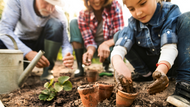A Guide to Sustainable Gardening
3rd May 2024
In an era where environmental consciousness is becoming increasingly crucial, sustainable gardening has emerged as a beacon of hope, offering a harmonious relationship between humans and nature. Whether you have a vast backyard or just a few pots on a balcony, adopting sustainable gardening practices can make a significant difference in reducing your ecological footprint while nurturing a thriving green space. Let's delve into the world of sustainable gardening and explore how you can cultivate your own patch of paradise while treading lightly on the planet.
Embrace Biodiversity
One of the fundamental principles of sustainable gardening is to promote biodiversity. Instead of monoculture planting, which can deplete soil nutrients and attract pests, opt for a diverse range of plants. Choose native species that are well-suited to the climate and soil conditions. Native plants require less water, fertiliser, and pesticides, contributing to a healthier ecosystem. Additionally, diverse plantings attract a variety of pollinators, such as bees and butterflies, essential for fruit and vegetable production.
Conserve Water
Water is a precious resource, and sustainable gardeners strive to use it wisely. Implement water-saving techniques such as mulching, which helps retain soil moisture and suppresses weed growth. Consider installing a water butt to collect rainwater for irrigation, reducing reliance on treated water sources. Drip irrigation systems deliver water directly to the plant's roots, minimising wastage through evaporation and runoff. By conserving water in the garden, you not only save money but also contribute to water conservation efforts in your community.
Practice Organic Gardening
Say goodbye to synthetic pesticides and fertilisers and embrace organic gardening methods. Avoiding chemical inputs not only protects the environment but also safeguards the health of your family and pets. Instead, use natural alternatives such as compost, manure, and organic pest controls. Composting kitchen scraps and yard waste not only reduces landfill waste but also enriches the soil with essential nutrients, fostering healthy plant growth. Emphasise soil health by practicing crop rotation and incorporating cover crops to prevent erosion and improve soil structure.
Support Wildlife Habitats
Create a haven for wildlife in your garden by providing food, water, and shelter. Install bird feeders, bird baths, and nesting boxes to attract avian visitors. Leave patches of wildflowers and native grasses to provide habitat for insects, birds, and small mammals. Avoid using chemical pesticides that can harm beneficial insects like ladybugs and bees. By nurturing a biodiverse ecosystem, you contribute to the conservation of native wildlife while enjoying the beauty of nature in your garden.
Reduce Waste
Sustainable gardening extends beyond plant care to waste reduction practices. Choose durable, reusable gardening tools and containers instead of disposable plastic alternatives. Repurpose household items like old buckets and pallets for creative garden projects. Embrace the concept of "reduce, reuse, recycle" by minimising waste generation and recycling materials whenever possible. By adopting a mindful approach to consumption, you can minimise your environmental impact and promote a culture of sustainability.
Educate and Inspire
Share your passion for sustainable gardening with others and inspire positive change in your community. Host workshops, garden tours, or volunteer events to educate others about eco-friendly gardening practices. Encourage local schools to incorporate garden-based learning into their curriculum, fostering environmental stewardship from a young age. By empowering others to embrace sustainable gardening, you cultivate a network of like-minded individuals dedicated to preserving the planet for future generations.
Sustainable gardening offers a holistic approach to cultivating a thriving garden while minimising environmental impact. By embracing biodiversity, conserving water, practicing organic gardening, supporting wildlife habitats, reducing waste, and educating others, you can make a meaningful difference in creating a more sustainable future. So, roll up your sleeves, dig in the dirt, and let's cultivate a greener world, one garden at a time.






